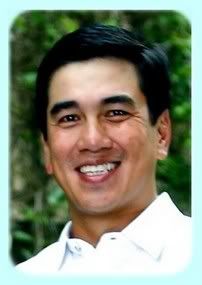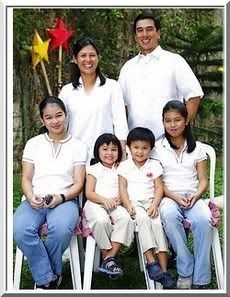Dr. Martin D. Bautista: Making A Difference
3.12.2007 interviewed by Dr. Emer Dr. Martin D. Bautista, 44, used to be a practicing Filipino gastroenterologist in Oklahoma, USA for 17 years, but recently decided to return home to the Philippines to run for Senator in the coming May elections this year.
Dr. Martin D. Bautista, 44, used to be a practicing Filipino gastroenterologist in Oklahoma, USA for 17 years, but recently decided to return home to the Philippines to run for Senator in the coming May elections this year.
A foolish decision? Highly-esteemed pundits like Conrado de Quiros and Katrina Legarda do not think so. In fact, they think he is doing this country a great service by making a difference when it really matters.
Dr. Bautista always had the Philippines in his mind while abroad. A few years ago, in a TV program hosted by Ann Curry about Asian Americans in the US, Dr. Bautista was quoted saying that not returning to the Philippines would be like "a tragedy beyond description."
In an email exchange last week, I found out more about this good doctor, and it is my honor to present to you details of my interview with him:
DR. EMER: In your blogpost last March 3, you have mentioned that "the traditional political formula has only served to make the poor poorer," and mentioned "a different way" of solving our current problems. What is this "different way?" Traditional politicians have tried and failed with their missions. If you won, what will make your program of government any different?
DR. MARTIN BAUTISTA: The traditional path has always made our politicians beholden to special interests that strengthen their own political power at the expense of becoming less credible and capable to make difficult decisions that will advance the common good. We need political servant-leaders who recognize that the longer you stay in the arena, the less creative you become and you likewise become more attached to the perks of position, hence we need leaders who will stay for no more than one term and therefore will not be afraid to make enlightened choices that will benefit the most number of people. More importantly is a leader with a clear vision of what direction the country needs to take honed by years of study and preparation and not out of some obligation to continue a political dynasty or protect narrow economic interests.
Do you really believe that one man can make a difference? You know how enormous our problems here. From simple garbage disposal to traffic and sickening corruption, no politician before has been able to put an end to those. Don't you think you are embarking on a quixotic journey?
But do we have a choice? There comes a point in our lives when living a good and secure and prosperous existence becomes immoral when you cast a blind eye to the terrible suffering all around us. If you truly believe in your heart that you can offer whatever blessings and talents that have been given to you but decide to back-off because of the tremendous sacrifice in loss of privacy, income, security and family time then you would not only have failed yourself but your country as well.
Pundits have pondered what the Filipino problem is --- some say it is a damaged culture, some say we are all plain lazy, and still others say its our perennial colonial mentality. In your analysis, what is really our problem? Why can't we seem to get out of this quicksand? Some neighboring Asian neighbors were our inferiors years ago, but now they have overtaken us in terms of progress. What keeps us down and lagging behind?
For more than 20 years, Filipinos have participated in a controlled trial that isolates them in groups in various foreign lands and observed how they behave and interact in other environments. The conclusions are definitive: Filipinos work harder, follow rules, become more socially responsible and think about the future more often. So it is not in the Filipino. It is because our leaders have failed us. Political expediency has priority over moral principles. Case in point is the continuing obsession to become a "model debtor" nation and pay off every last cent of interest including those originating from odious loans. We are able to do this at the expense of the poor having even less social services, poorer education and crumbling infrastructure. This is the type of leadership that prioritizes looking good before the international bankers over widespread malnutrition in the countryside. We really must try something else because this leadership formula clearly is not working. If I may be allowed to dream for even a fraction of our overseas sisters and brothers to return and help redeem our prodigious national promise.
 Did you always want to become a doctor or a politician? Why?
Did you always want to become a doctor or a politician? Why?I graduated from High School in 1980 and this was the height of the Marcos dictatorship. Those were very dark days. I was certainly not prepared nor equipped to become poltically active. I looked for a profession that would provide me with financial stability and at the same time be in a position to help others. I was already in my third year of medical school when Marcos was thrown out.
What is your opinion of Filipino doctors becoming nurses and working abroad? How do you propose to stop this hemorrhage of medical personnel in our country?
We all have to do what we have to do for our families. The better path would be for doctors to become nurses so they can enter the US, study for the exams and then seek further medical training. This is the only country that pays Attending physicians full-time salaries to read, research and teach interns and residents and fellows. Trainees get the undivided attention of wonderful physician-teachers. The facilities in the US are beyond comparison. There is no question about the superiority of graduate medical education in the US. Finally, living alone in the US teaches you valuable lessons on how to live. Remember how the OFW experience makes us into better citizens? It is up to us here in the Philippines to make our country irresistible to Filipino physicians. I learned that in my 17 years abroad. The Philippines is our country and we should unite to take it back from those who simply want us to remit dollars in order to pursue selfish political ends.
Other than parallel importation of vital drugs, how do you propose to bring down the prices of expensive medicines in the Philippines?
We need to focus on identifying those "garden-variety diseases" that if left untreated result in major economic costs like hypertension. We should not insist on Amlodipine besylate because we cannot afford this drug yet. Why can't we manufacture our own hydrochlorothiazide or propranolol or even enalapril? The technology is simple. Our leaders have simply become too awed by all these high-powered pharmaceutical executives. Take the case of diabetes, metformin and glipizide are not difficult to compound. We must also engage in more research regarding herbal medications. There is a lot of potential here.
Who are your heroes in life? In what way do they influence your outlook in life?
Rizal, Gandhi, MacArthur, Bill Clinton --- highly imperfect people who persisted in leaving the world a better place than how they found it.
What do you do in your spare time? Do you still find time to read? What are some of your favorite books?
I was beginning to get good at golf and I hope to resume playing daily once this part of my journey ends. I have always tried to read for at least 2 hours each day. Mostly history, biographies, culture, poetry, fiction, a little philosophy. The Seven Storey Mountain by Merton, Sophie's Choice by Styron, The Remains of the Day by Ishiguro, Life of Pi by Martel come to mind. There are so many good books.
What is your opinion on the Philippines becoming a destination for medical tourism? Will you promote this if you get elected?
We need to act fast on this one. Thailand and India and Singapore are already so far ahead. We need to focus on low-tech-service-intensive medical tourism like long-term rehabilitation facilities and assisted-living facilities and nursing homes. The demand for these services will only get greater. These are the "tourists" who will have no problem paying for high-quality care.
Heaven-forbid that you don't get elected, what will you do? Will you return to the US? Will you run again in the next elections? Or will you simply return to medical practice?
What? Me lose to Loren or to Ping Lacson or Tito Sotto? I can't even begin to imagine the devastating consequences.....
On the Net: Dr. Bautista's blog --- On My Way Home



